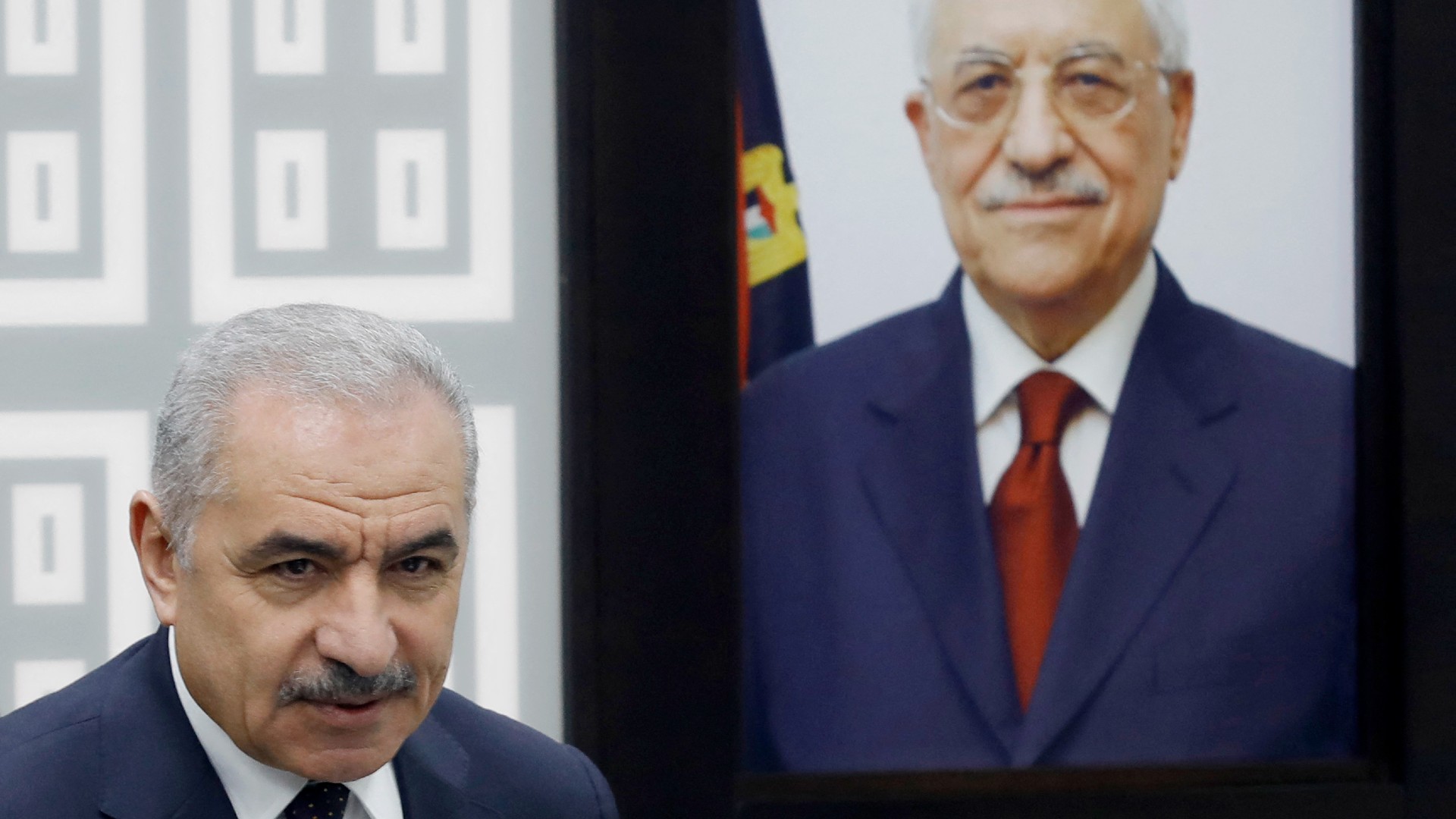Will new PM improve Palestinian Authority's standing?
Appointment of 'technocratic' government first step to building support for expanded role in Gaza

A free daily email with the biggest news stories of the day – and the best features from TheWeek.com
You are now subscribed
Your newsletter sign-up was successful
The Palestinian Authority has signalled willingness to change with the resignation of its prime minister and government, as it looks to build support for an expanded post-war role in Gaza – and a future Palestinian state.
Addressing his cabinet on Monday, outgoing PM Mohammad Shtayyeh said the next stage would "require new governmental and political arrangements that take into account the emerging reality in the Gaza Strip, the national unity talks, and the urgent need for an inter-Palestinian consensus". It would also need "the extension of the Authority's authority over the entire land, Palestine".
The Palestinian Authority was created 30 years ago as part of the interim Oslo peace accords, but has been "badly undermined by accusations of ineffectiveness and corruption and the prime minister holds little effective power", said Reuters.
The Week
Escape your echo chamber. Get the facts behind the news, plus analysis from multiple perspectives.

Sign up for The Week's Free Newsletters
From our morning news briefing to a weekly Good News Newsletter, get the best of The Week delivered directly to your inbox.
From our morning news briefing to a weekly Good News Newsletter, get the best of The Week delivered directly to your inbox.
But Shtayyeh's departure marks "a symbolic shift" that underlines the determination of the PA's President Mahmoud] Abbas to "ensure the Authority maintains its claim to leadership as international pressure grows for a revival of efforts to create a Palestinian state alongside Israel".
What did the commentators say?
The favourite to take over as PM is Mohammad Mustafa, an economist currently heading Palestine's sovereign wealth fund. He has "cultivated a close relationship" with Abbas and "would be acceptable to America and Israel", said The Economist – "although less so with his own people (his poll numbers are anaemic)".
The "hope" is that he would "clean up the PA's endemic graft and dysfunction", which has long been "a key demand of its supporters in the West and the Gulf", in exchange for "renewed financial support". Unfortunately, the "reality will probably be different".
"The current Palestinian government has overseen a period of immense instability in the West Bank," said Time. Yet the root of the problem lies with Abbas himself. The 88-year-old has ruled by presidential decree since he was elected to a four-year term in 2005. In the intervening years, both Abbas and the PA have seen their support plummet among the Palestinian public, owing to "tensions caused by increased Israeli settlement construction, allegations of widespread corruption and the lack of a viable path to statehood", said the Financial Times (FT).
A free daily email with the biggest news stories of the day – and the best features from TheWeek.com
A December poll conducted by the Palestinian Center for Policy and Survey Research found that 60% of respondents in the West Bank and Gaza supported the PA's dissolution, with nearly 90% demanding Abbas's resignation. Support for Hamas, meanwhile, has surged since the 7 October attack on Israel.
During his nearly two decades in power, Abbas has "largely resisted demands from the international community for the PA to institute significant reforms", said the FT. But Monday's move "signals a willingness by the Western-backed Palestinian leadership to accept a shake-up that might usher in reforms seen as necessary to revitalise the Palestinian Authority", said Euronews.
What next?
Many observers regard this as a necessary "first step" towards forming a new "technocratic" Palestinian administration to "govern the Palestinian territories and to oversee the reconstruction of Gaza after Israel's war to root out Hamas from the besieged enclave comes to an end", said Time.
Last month, Axios reported that senior national security officials from Saudi Arabia, Jordan, Egypt and the Palestinian Authority had "secretly met" in Riyadh to "coordinate plans for the day after the war in Gaza and discuss ways to involve a revitalised Palestinian Authority in governing there". The meeting was "another sign of the increased coordination between Saudi Arabia and the PA".
Fatah, the faction that controls the PA, and Hamas are also trying to "bridge their differences and reach an agreement over a unity government", said Reuters. Envoys from both groups are due to meet in Moscow on Wednesday.
In the short term, the US wants a reformed Palestinian Authority to govern Gaza once the war is over, although "many obstacles remain to making that vision a reality", said Euronews. Chief among these is Israel's Prime Minister Benjamin Netanyahu, who has rejected the prospect of the PA having any role in Gaza after the war. Instead, he has offered his own vision for the so-called "day after" the war in which Israel maintains ndefinite control over the West Bank and Gaza, "thus neutering the possibility of the establishment of a Palestinian state", said Time.
Ultimately, though, the US is hoping to link normalisation between Israel and Saudi Arabia and greater cooperation between a reformed PA and its Arab neighbours to the creation of a pathway for the establishment of a Palestinian state.
Elliott Goat is a freelance writer at The Week Digital. A winner of The Independent's Wyn Harness Award, he has been a journalist for over a decade with a focus on human rights, disinformation and elections. He is co-founder and director of Brussels-based investigative NGO Unhack Democracy, which works to support electoral integrity across Europe. A Winston Churchill Memorial Trust Fellow focusing on unions and the Future of Work, Elliott is a founding member of the RSA's Good Work Guild and a contributor to the International State Crime Initiative, an interdisciplinary forum for research, reportage and training on state violence and corruption.